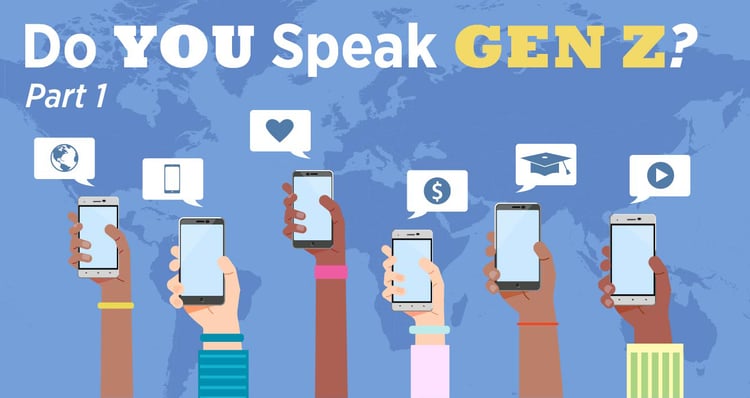
TikTok. Microinfluencers. Memes. Welcome to Gen Z.
There are now an estimated 1.2 billion Gen Z teenagers and young adults globally. So, yeah, they’re kind of a big deal, even if there’s no consensus on when exactly they were born (likely between 1996 and 2010) or what exactly to call them (iGen, Plurals, and Founders are among the other monikers that have been thrown at this diverse, tech-savvy bunch.)
But one thing’s for sure — Gen Zers are very different than the Millennials who came before them. And now they’re your student recruitment target audience.
You’ve heard the Gen Z generalizations: they’re inclusive and politically active. They’re anxious about their future, about the environment, about the economy. About, well, everything (cue melodramatic music).
But what exactly does all of this mean for your institution’s efforts to recruit and retain Gen Z students?
In this two-part series, we'll be sharing the A-Z on Gen Z, including the key traits of this new audience and how to tailor your institution's enrollment management and specifically, your digital marketing strategy to their 21st Century tastes.
Plus, if you want to learn even more from us at the AIRC Conference, read on for the scoop.
Gen Zers Are Digital Natives
Unlike the Millennials who came before them, most Gen Zers have little to no memory of an analog world. They are the first generation for whom smartphones and social media are as natural as the air they breathe. Just for kicks, hand them a form and ask them to fax it and walk away. Have someone surreptitiously capture their facial expressions on a smartphone.
Gen Z is connected. According to a 2018 Pew Research Center survey, 95% of teens own a smartphone and 45% of them report that they are online on a near constant basis. You knew this already.
What this means for your marketing: Your digital strategy is now more important than ever. Gen Zers expect mobile optimized content including videos, robust social platforms, and immediate access to information on your institution’s programs and services. Broken links on your social ads and in your nurture emails, well, they will have little patience and will move on with a swipe.
Where this really causes headaches for many of the institutions we work with is websites - often not mobile friendly, much less mobile ready. And worse, the internal processes to fix broken links and other obsolete content can drive leaders around the bend.
A word to the wise: Check your work carefully before you launch your digital campaigns.
If you are seeking to learn more (of course you are),
Attend our favorite learning gathering: AIRC Annual Conference.
Intead will be presenting with some really smart colleagues among the many other great opportunities to learn:
- Digital Campaigns that Diversify Your Draw
Dec 1 from 2:30-3:30pm (Eastern)
Discussing quick-hit digital marketing campaigns. Real student recruitment results and benchmarks will be shared.
- The New Fight for Onshore International Students
Dec 2 from 11:00 am - 12:00 pm (Eastern)
Discussing increasing competition for international transfer students already in the US and the role of recruiting agencies in that process.
Gen Zers Are Financially Conservative
As children of the 2008 Recession, financial security is on the minds of Gen Zers. They’ve seen parents and relatives lose homes and jobs and watched the bright-eyed Millennials before them take on heavy student loan debt and struggle in the job market.
In a recent survey of nearly 1,200 students from the book Generation Z Goes to College, more than 80% of Gen Z students reported being concerned about the cost of higher education. A recent Harris poll produced similar findings: 81% of Gen Zers aged 18 to 21 report that money is a source of significant stress in their lives, and 63% of Gen Zers aged 15 to 17 report that their families not having enough money is a significant source of stress.
While they have concerns about financing their education, they are less willing than the generation before to take on student loans. In a 2019 survey of around 500 high school students, 46% of Gen Zers said they might take out student loans, down from 65% the previous year. The survey also found that 89% of younger learners planned to work while in school.
What this means for your marketing: Lean into your institution’s financing options in your Gen Z recruitment efforts. Some institutions have adopted price matching and tuition guarantees in order to appeal to this segment. Highlight work-study programs, paid co-ops, and other opportunities for Gen Z to earn while completing their studies.
A word to the wise: The more you can do here, the higher your enrollment numbers will go. Word of mouth marketing will play a BIG role here as you help Gen Zers afford college and succeed. You can give that word of mouth a bit of a prod on social media as the opportunities present themselves.
Gen Zers Are Practical
A natural corollary to Gen Z’s concerns about finances? They care about their field of study and future career prospects. A lot. Almost 60% of Gen Z students believe that the purpose of college is to prepare its graduating students for specific careers, and more than half of students say program availability is the most important factor in their college choice.
What this means for your marketing: One in five Gen Zers say that they may choose not to go to college. It is your job to convince them. Communicate the value of your degree and be transparent. Tie your programs to specific graduate salary and employment results. Show them practical outcomes.
A word to the wise: Use video to do it.
On deck for next week? Gen Z's unconventional career aspirations and the specific programs you should be offering to catch their attention. Ready to get started on those Gen Z-approved digital campaigns already? Get in touch.



